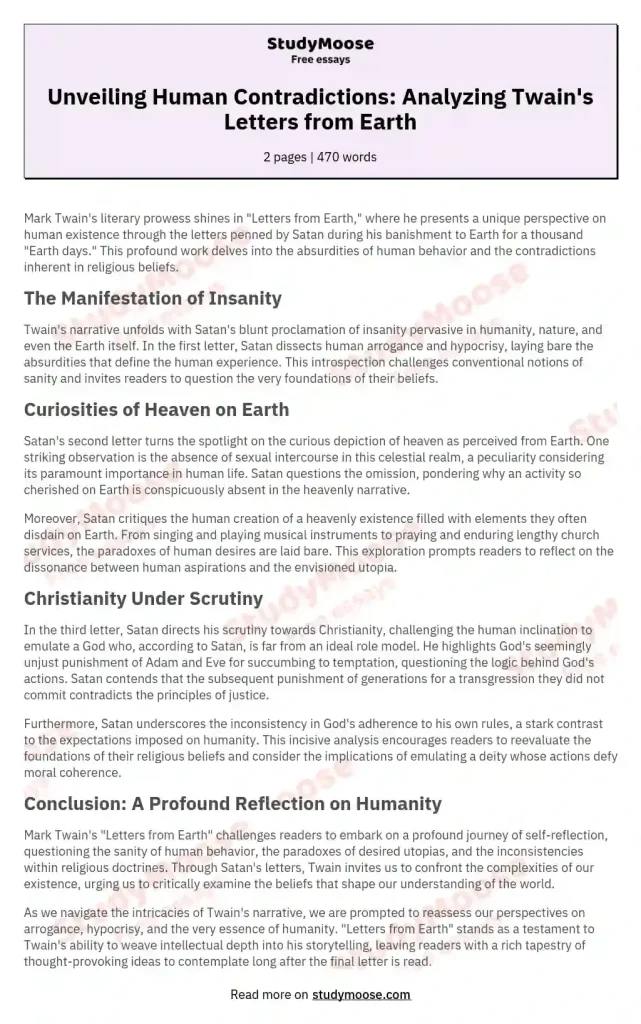Mark Twain contradictions reveal the intricate layers of one of America’s most celebrated literary figures. As both a populist and a patrician, a hustler and a moralist, Twain epitomized the tensions within 19th-century America and continues to captivate readers with his dynamic persona today. His biography is rife with paradoxes, from his satirical commentary on society to his deeply personal struggles as an author. Works like “The Adventures of Huckleberry Finn” showcase these contradictions, highlighting themes of race and individualism while also reflecting Twain’s personal views and societal norms of his time. This literary legacy remains essential to understanding his complex character and the ever-evolving interpretation of his writings.
The complexities of Mark Twain’s identity can also be understood through the lens of contrasting elements in his life. Renowned as a humorist and critic of social injustices, Twain’s literary contributions are layered with juxtaposed themes that reflect the dualities of human nature. His satirical prose often critiques the very society he participated in, showcasing an ongoing internal conflict between commercial success and artistic integrity. As we delve into his writings, such as “Huckleberry Finn,” we uncover a battle between freedom and societal constraints, encapsulating the multifaceted spirit of a man who both challenged and conformed to the expectations of his era. Thus, the exploration of Twain’s contradictions opens a window into the richness of American literature and the enduring questions it raises about morality and identity.
The Complex Legacy of Mark Twain
Mark Twain, born Samuel Langhorne Clemens, is often celebrated as one of the most significant figures in American literature. His ability to intertwine humor with profound social commentary has ensured his works remain relevant. Scholars have delved deep into his life and writings, from the satirical brilliance of ‘The Adventures of Huckleberry Finn’ to the captivating narratives in ‘The Celebrated Jumping Frog of Calaveras County.’ This exploration reveals a literary legacy that challenges readers to confront the American identity, encapsulating themes of race, morality, and the contradictions within human nature.
Moreover, Twain’s biography is as compelling as his fiction. Raised in a poor family that had once laid claim to Southern gentility, Twain’s life oscillated between financial ruin and literary stardom. His portrayal of the American South, embedded in complex racial dynamics, continues to provoke critical discussions. Mark Twain’s ability to reflect America’s social anxieties through characters like Huck Finn positions him as a critical commentator on issues that resonate even today.
Mark Twain’s Contradictions: A Reflection of America
The contradictions in Mark Twain’s life and work serve as a mirror reflecting the complexities of American society. Twain embodied contrasting identities—a populist writer critiquing social injustice, while simultaneously enjoying the privileges of a patrician background. His works, particularly ‘Huckleberry Finn’, juxtapose the innocence of childhood against the harsh realities of racism and slavery, demonstrating his internal conflicts regarding morality and societal norms. Twain’s satirical wit often masked his deep-rooted pessimism about human nature, revealing the dualities that defined his persona.
Twain’s observations on friendship and freedom, embodied in Huck’s adventures, blur the lines between loyalty and moral responsibility. His characters journey through landscapes riddled with social contradictions, mirroring Twain’s own life as he navigated between wealth and debt, celebrity and obscurity. These contradictions not only shape Twain’s narrative style but also invite readers to reflect on their own societal views, compelling them to confront the uncomfortable truths that lie within the fabric of American identity.
The Impact of Mark Twain’s Satirical Voice
Mark Twain’s sharp satirical voice has left an indelible mark on American literature, transforming how humor can be employed to critique social norms. Through the lens of satire, Twain exposes the hypocrisies of society, encouraging readers to question the status quo. His works often satirize the moral failings of his contemporaries and institutions, thereby generating a dialogue about ethics and integrity. With ‘A Connecticut Yankee in King Arthur’s Court’, Twain not only critiques the romantic notions of chivalry but also addresses the absurdities of progress and democracy, making his satire timeless.
Moreover, his narrative methods—blending humor with profound social commentary—have paved the way for future writers to address societal issues through humor. This fusion of comedy and critique establishes Twain as a forerunner of modern satirical writing. His influence can be traced through generations of authors who leverage humor as a means of societal reflection. Twain’s ability to balance entertainment with serious discourse continues to resonate, solidifying his reputation as a literary icon whose works are essential in understanding American culture and its contradictions.
Mark Twain: The Man behind the Myth
The persona of Mark Twain, often embellished by his own storytelling, layers the complexity of his true character. Twain carefully curated his public image, presenting himself as the quintessential American humorist yet grappling with his own failures and disillusionments behind closed doors. His infamous white suit, a symbol of his celebrity, belied a man burdened by tragedy and foreboding, particularly following the deaths of his wife and daughters. This juxtaposition creates a myth around Twain—a recluse who simultaneously thrived in public life, revealing the fascinating tensions within his personal and professional realms.
Twain’s biography showcases a man who never fully escaped the weight of his contradictions. His ventures into business often juxtaposed his literary aspirations, leading him into financial ruin while simultaneously enriching his storytelling. This duality extends to his relationships, where he cherished connections while also exhibiting troubling behaviors towards younger girls, resulting in a contentious legacy. The synthesis of these elements establishes Twain not just as a literary genius but as a flawed human being, urging readers to grapple with both his contributions and his controversies.
Exploring Themes of Race in Twain’s Works
Race remains a central theme in Mark Twain’s writings, reflecting the social landscape of 19th-century America. In ‘Huckleberry Finn’, Twain candidly addresses the issue of race through the rich relationship between Huck and Jim, questioning the moral fabric of society that accepts slavery. Twain’s portrayal of Jim navigates between caricature and humanity, suggesting both a critique of racist stereotypes and a deep empathy for Black individuals. The depiction of race in Twain’s works has sparked extensive debates among scholars and readers alike, who are challenged to confront their own preconceived notions of race and equality.
Moreover, Twain’s interactions with Black culture—from his upbringing in a racially charged environment to the profound connections he established through storytelling—reveal his nuanced understanding of race. While some critics argue that Twain’s narratives reflect a paternalistic view of race, others contend that his works are a realistic critique of the complexities surrounding race relations. This ongoing discussion about Twain’s literary portrayal of race continues to influence how we interpret not only his works but also the broader context of American literature and its historical underpinnings.
Mark Twain’s Literary Evolution and Experimentation
Mark Twain’s literary journey showcases a remarkable evolution, shaped by personal experiences and societal changes. Early in his career, Twain focused on light-hearted storytelling and regional humor, as seen in ‘The Celebrated Jumping Frog of Calaveras County’. However, as he matured as a writer, his narratives grew increasingly complex, tackling weighty themes such as morality, freedom, and human nature. The transition from whimsical tales to profound social critiques marks a significant shift in Twain’s approach, illustrating his ability to adapt and reflect the turbulent times in which he lived.
Furthermore, Twain’s engagement with narrative experimentation set him apart from his contemporaries. His innovative use of dialect and non-linear storytelling in ‘Huckleberry Finn’ revolutionized American fiction, paving the way for modern narrative techniques. Twain’s exploration of different genres—from satire to historical fiction—demonstrates his versatility and commitment to capturing the multifaceted nature of American life. This literary evolution not only cements Twain’s status as a pioneering figure in American literature but also inspires future writers to challenge conventions and push the boundaries of storytelling.
The Intricate Relationship between Twain and American Identity
Mark Twain’s works encapsulate the essence of American identity, grappling with the nation’s ideals and contradictions through his characters and narratives. His depiction of the American landscape in stories like ‘The Adventures of Tom Sawyer’ and ‘Huckleberry Finn’ reflects the tumultuous progression of the United States, embodying both its dreams and its disillusionments. Twain’s storytelling serves as a means to critique American society, shedding light on issues such as racism, freedom, and moral integrity, thereby illustrating the complex interplay between individual and collective identity.
Moreover, Twain’s characters often symbolize broader themes resonating with the American experience. Huck Finn, a young boy torn between societal expectations and personal beliefs, epitomizes the struggle for authenticity in a conformist society. Twain’s ability to craft relatable characters navigating through moral dilemmas invites readers to introspect on their beliefs and values. This intricate relationship between Twain’s narratives and American identity ensures his relevance in discussions surrounding cultural and societal issues, engaging readers in a conversation about the evolving definition of what it means to be American.
The Enduring Influence of Mark Twain in Modern Literature
Mark Twain’s influence on modern literature is both profound and enduring, serving as a cornerstone for writers exploring similar themes of identity, race, and societal critique. His unique narrative style and deft handling of satire have inspired countless authors, including contemporaries and modern writers alike. Twain’s ability to tackle difficult subjects with humor and honesty resonates with many contemporary writers who reflect on social issues through their own narratives, making his legacy vital to the evolution of American literature.
Additionally, the thematic exploration found in Twain’s work—the quest for individual truth and the interrogation of societal norms—continues to resonate today. Modern authors frequently cite Twain as a pivotal influence, crediting him with paving the way for literary styles that prioritize authenticity and nuance. By examining and reinterpreting Twain’s works, contemporary writers are able to engage in dialogues about race, class, and morality, central to the ongoing narrative of American identity. This lasting impact ensures that Twain’s voice remains vibrant in discussions of literature and society, confirming his status as a foundational figure in the literary canon.
Frequently Asked Questions
What are some notable contradictions in Mark Twain’s biography?
Mark Twain’s biography is filled with contradictions, reflecting his multifaceted persona. For instance, he was both a populist and a patrician, showcasing a tension between the common man’s struggles and the societal elite. Additionally, he was a brilliant satirist, critiquing American society, while simultaneously profiting from it as a successful businessman. This duality reveals the complexities of his character and the American identity he both championed and critiqued.
How do Mark Twain’s contradictions enhance his literary legacy?
The contradictions within Mark Twain’s character significantly enhance his literary legacy. By embodying diverse roles—such as a moralist versus a hustler—Twain created narratives that resonate on multiple levels. His works, including ‘Huckleberry Finn’ and ‘The Adventures of Tom Sawyer,’ reflect his conflicting views on race, morality, and society, prompting readers to examine their own beliefs and perceptions. This complexity encourages ongoing discussion and analysis, solidifying his status as a significant figure in American literature.
How does Twain’s satire highlight contradictions in American society?
Twain’s use of satire often points out the contradictions within American society, juxtaposing ideals against the reality of human behavior. In works like ‘Huckleberry Finn,’ Twain illustrates the conflict between societal norms and personal morality, particularly regarding issues of race and freedom. His wit exposes hypocrisy in social institutions, prompting readers to reflect on the inconsistencies within the American dream. This ability to navigate and critique contradictions makes Twain’s satire timeless and impactful.
In what ways does ‘Huckleberry Finn’ illustrate Mark Twain’s personal contradictions?
‘Huckleberry Finn’ serves as a powerful illustration of Mark Twain’s personal contradictions. The protagonist, Huck, represents Twain’s wit and youthful innocence, navigating a world rife with moral complexity. Twain wrestles with themes of race and slavery, reflecting his own conflicting feelings about these issues. The novel’s ending, marked by an unresolved moral dilemma, echoes Twain’s inner struggles and critiques the societal norms of his time, revealing the tension between his ideals and the world around him.
What aspects of Twain’s financial pursuits reveal his contradictions as an author?
Mark Twain’s financial pursuits highlight his contradictions as an author. Despite being a renowned literary figure, Twain engaged in numerous business ventures, often failing to achieve financial stability. His penchant for investing in risk-laden projects, such as the Paige typesetter, contrasts sharply with the astute observations he made in his writings about human folly and greed. This irony underscores the complexity of Twain’s character—capable of profound literary insight yet perpetually striving for financial success.
How does Twain’s approach to race in his works reflect his internal contradictions?
Twain’s approach to race in his writings exemplifies his internal contradictions. While he is celebrated for his portrayal of Black characters, particularly in ‘Huckleberry Finn,’ he simultaneously held views that reflect the prevailing racial attitudes of his time. His humor often masked deeper social critiques, revealing his struggle with societal norms and his moral beliefs. This tension between his literary representation of race and his personal convictions adds depth to his works, compelling readers to engage in critical discussions about race.
Why are contradictions in Twain’s character important for understanding his literary themes?
The contradictions in Twain’s character are vital for understanding his literary themes, as they mirror the complexities within American society. His perspectives on morality, race, and human nature are shaped by his lived experiences and internal conflicts. By acknowledging these contradictions, readers can appreciate the nuanced ways Twain explores themes of truth, freedom, and social justice, making his works relevant across generations and encouraging a deeper critical engagement with American culture.
| Key Point | Explanation |
|---|---|
| Mark Twain’s Contradictions | Twain was a blend of populist and patrician, hustler and moralist, representing the tensions in American society. |
| Literary Contributions | Despite his contradictions, Twain’s works, like ‘Huckleberry Finn’ and ‘Tom Sawyer’, are pivotal in American literature. |
| Business Ventures | Twain often struggled financially as a businessman, despite being a successful author; his investments frequently led to debt. |
| Complex Legacy | Twain’s life was marked by intricate relationships, views on race, and a struggle against his own contradictions, making him a complex figure. |
| Cultural Impact | Twain’s ability to blend humor and social criticism has allowed his work to resonate and remain relevant in modern discussions about America. |
Summary
Mark Twain contradictions define the enigmatic nature of one of America’s most celebrated authors. He is revered for his profound contributions to literature while simultaneously critiqued for his complicated views and personal struggles. This duality reflects a larger narrative of American identity, showcasing how Twain navigated the intricate intersections of race, morality, and fame. His legacy persists today, making him a subject of intense literary exploration and cultural analysis.



